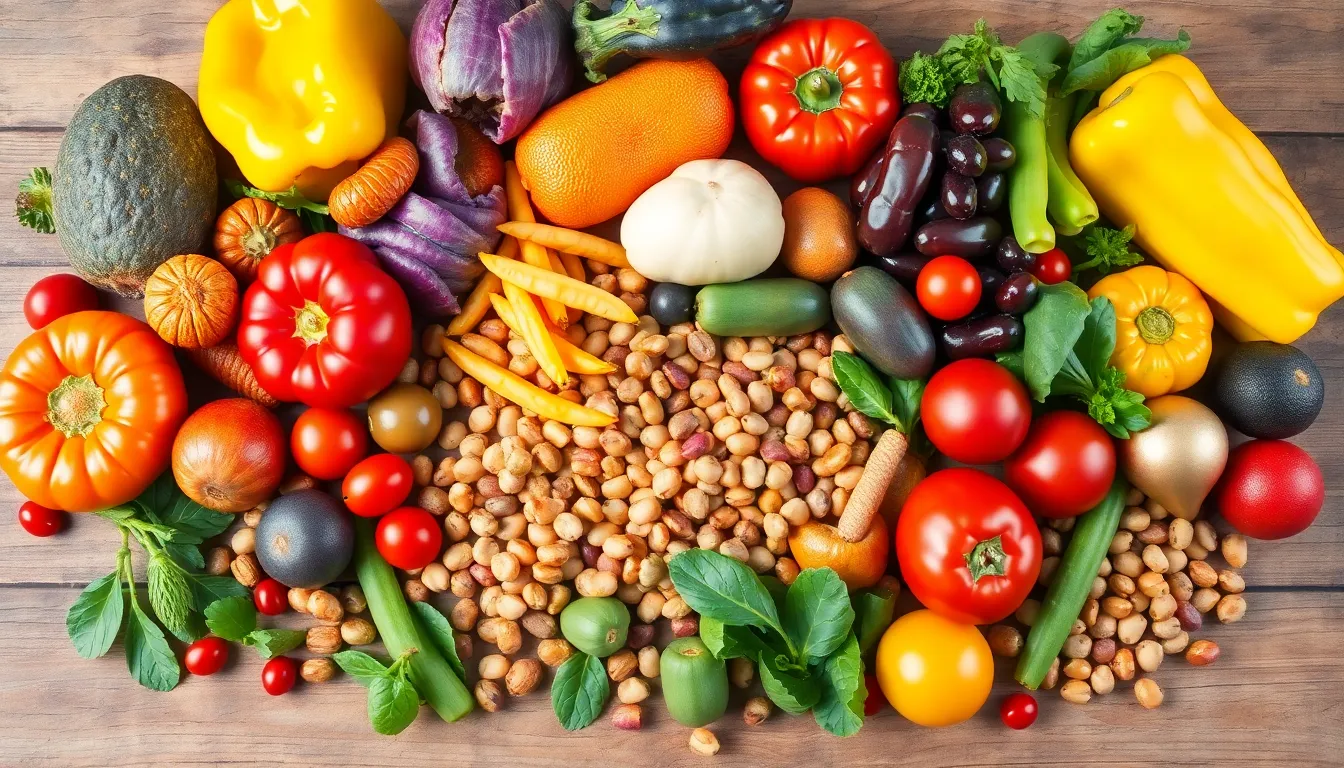Table of Contents
ToggleIn a world where kale reigns supreme and tofu has become a culinary superstar, vegan recipes are stealing the spotlight. Whether you’re a seasoned plant-based pro or just dipping your toes into the world of veggies, there’s a treasure trove of deliciousness waiting for you. Who knew that chickpeas could be so versatile?
Overview of Vegan Recipes
Vegan recipes showcase an array of ingredients, highlighting the flavor and nutrition of plant-based foods. They eliminate animal products, focusing instead on fruits, vegetables, grains, legumes, nuts, and seeds. Chickpeas, for example, serve as a versatile protein source, appearing in various dishes from salads to stews.
Nutrient-rich options abound in this cooking style. Spinach and quinoa deliver essential vitamins and minerals, ensuring meals are satisfying and healthful. Seasonal vegetables, when used creatively, enhance dishes’ taste and visual appeal.
Cooking methods for vegan recipes vary widely. Roasting brings out the natural sweetness in vegetables, while stir-frying preserves their texture and nutrients. Each approach contributes distinct flavors and makes plant-based meals enjoyable.
Ingredient substitutions play a key role in vegan cooking. For instance, almond milk often replaces dairy milk, making recipes accessible to those with lactose intolerance. Silken tofu can substitute for eggs in baking, resulting in moist cakes and muffins.
Global culinary influences enrich vegan recipes even further. Middle Eastern spices, for instance, elevate dishes like hummus and falafel. Asian flavors, such as soy sauce and ginger, enhance stir-fries, offering a multitude of taste experiences.
Accessibility of vegan recipes enables appealing options for everyone, regardless of culinary skill level. Simple preparations encourage novice cooks, while complex dishes challenge seasoned chefs. Enthusiasts can discover new favorites through endless combinations and creative adaptations.
Benefits of a Vegan Diet

A vegan diet offers numerous advantages for health and the environment. The diverse plant-based ingredients provide opportunities for individuals to enhance their well-being while contributing positively to the planet.
Health Benefits
Vegan diets are rich in nutrients. They often include fruits, vegetables, grains, legumes, nuts, and seeds. Increased fiber intake promotes digestive health, reducing the risk of gastrointestinal issues. Many studies suggest a link between plant-based diets and lower rates of chronic diseases, including heart disease and diabetes. Individuals who adopt veganism generally experience reduced cholesterol levels. Weight management benefits also arise, as plant foods tend to be lower in calories while being nutrient-dense. Overall, the focus on wholesome foods supports improved energy levels and overall vitality.
Environmental Impact
Choosing a vegan diet significantly lessens one’s carbon footprint. Animal agriculture contributes substantially to greenhouse gas emissions. By opting for plant-based ingredients, individuals help reduce deforestation associated with livestock farming. Water usage declines with a vegan lifestyle, as crops require less water compared to raising animals. Furthermore, adopting vegan recipes encourages biodiversity and promotes sustainability in food systems. Numerous studies indicate that widespread veganism could mitigate climate change impacts, making plant-based diets a crucial component of future environmental efforts.
Popular Vegan Ingredients
Vegan cooking incorporates a variety of ingredients that enhance flavor and nutritional value. This section explores key components in plant-based recipes.
Fruits and Vegetables
Fruits and vegetables are central to vegan dishes. They provide essential vitamins and minerals while adding vibrant colors. Seasonal produce like tomatoes, peppers, and squash introduces freshness and enhances flavors. Avocados contribute healthy fats, making a meal more satisfying. Berries and citrus fruits lend natural sweetness, perfect for desserts or smoothies. Incorporating a variety of produce ensures diverse nutrient intake and keeps meals exciting.
Plant-Based Proteins
Plant-based proteins form the backbone of a vegan diet. Legumes such as lentils and chickpeas pack a protein punch. Black beans often serve as a flavorful base for tacos and salads, while quinoa stands out as a complete protein grain. Tempeh and seitan offer versatile meat substitutes, rich in texture and taste. Nuts and seeds, including almonds and chia seeds, contribute protein and healthy fats, promoting satiety. Selecting a mix of these sources ensures adequate protein intake and supports overall health.
Spices and Herbs
Spices and herbs elevate the taste of vegan meals. Cumin and coriander add warmth and depth to soups and stews. Fresh herbs like basil and cilantro brighten dishes with their aromatic qualities. Turmeric carries anti-inflammatory properties, enhancing both flavor and health benefits. Nutritional yeast provides a cheesy flavor, making it ideal for creamy sauces. Experimenting with different spices and herbs opens up a world of culinary possibilities, transforming simple ingredients into flavorful masterpieces.
Easy Vegan Recipes for Beginners
Creating simple vegan meals offers enjoyable culinary experiences for beginners. The following ideas provide easy entry points into tasty plant-based cooking.
Breakfast Ideas
Overnight oats stand out as a nutritious breakfast option that requires minimal effort. Combine rolled oats with almond milk and top with fruits, nuts, or seeds for added texture. Smoothies blend a variety of ingredients, like spinach, bananas, and nut butter, creating delicious, nutrient-packed drinks. Consider avocado toast, a quick meal that involves smashing ripe avocados on whole grain toast, finished with seasonings or tomato slices. Each of these recipes can be customized based on individual taste preferences, ensuring variety in early meals.
Lunch and Dinner Options
Chickpea salad serves as a versatile lunch option. Mix canned chickpeas, diced cucumbers, bell peppers, and a drizzle of lemon juice for a refreshing dish. Stir-fried vegetables with tofu offers a quick dinner choice, providing a rich source of protein and fiber. Combine seasonal vegetables, like carrots and broccoli, with firm tofu in your favorite sauce for a flavorful meal. Lentil soup introduces a hearty choice that combines lentils, tomatoes, and spices, perfect for cozy evenings. These dishes incorporate essential nutrients while highlighting the delicious flavors of plant-based cooking.
Advanced Vegan Recipes
Advanced vegan recipes offer exciting culinary experiences for those eager to explore plant-based cooking. Gourmet dishes and decadent desserts showcase the versatility of vegan ingredients.
Gourmet Dishes
Gourmet vegan dishes elevate dining experiences through sophisticated flavor combinations. Mushroom risotto made with creamy cashew cheese provides a rich texture. Eggplant stacks boast layers of roasted veggies, complemented by a basil-garlic sauce. Vegan paella incorporates saffron-infused rice mixed with seasonal vegetables and chickpeas, bringing a unique twist to a classic dish. Experimenting with techniques like sous-vide adds an elegant touch, while presentation plays a crucial role in enhancing the overall experience.
Desserts and Treats
Desserts and treats in the vegan realm surprise with their indulgent flavors and textures. Chocolate avocado mousse, rich and creamy, satisfies sweet cravings without dairy. Fruit tarts filled with cashew cream deliver a refreshing balance of sweetness and acidity. Using aquafaba, replaces egg whites in meringues, resulting in light, airy delicacies. Furthermore, raw energy bites made with dates, nuts, and seeds provide a quick, nutritious snack. Each recipe demonstrates the endless possibilities of crafting delicious vegan sweets.
Embracing vegan recipes opens up a world of culinary creativity and health benefits. With a vast array of ingredients and cooking techniques at one’s disposal, anyone can enjoy delicious plant-based meals. Whether experimenting with seasonal produce or trying out global flavors, the possibilities are endless.
Adopting a vegan lifestyle not only enhances personal well-being but also contributes positively to the environment. By choosing plant-based options, individuals can support sustainability efforts while indulging in vibrant and satisfying dishes. The journey into vegan cooking is both rewarding and enjoyable, inviting everyone to explore the rich flavors and nutritional advantages of a plant-based diet.




